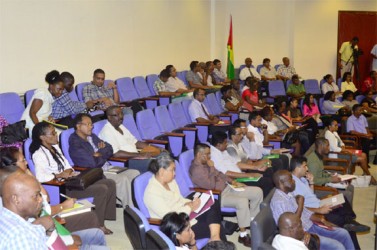The AFC will not support a bid by the government to retain a role in the supervision of contract awards once the Public Procurement Commis-sion (PPC) is in place, party Vice-Chairman Moses Nagamootoo said yesterday, even as Minister Juan Edghill said there needs to be a call for consensus on the establishment of the body.
In response to a new call by the Private Sector Commission (PSC) last week for the breaking of the impasse over the PPC, Presidential Adviser on Governance Gail Teixeira noted that the government wanted an amendment to the Procurement Act to preserve the role of Cabinet in state contracts. Currently, contracts awarded by the National Procurement and Tender Administration Board (NPTAB) proceed once Cabinet gives a “no objection.”
But just about one hour before a Procurement Sympo-sium organized by the government, Nagamootoo told a news conference that the AFC would not support amending the 2003 Public Procurement Act.

“We find that repugnant; repugnant both to the constitution and to the law because the law stipulates that upon the setting up of the Public Procurement Commission that the role of the cabinet in contract ends. There is no ambivalence over that,” he said.
In fact, Article 51 (1) of the Procurement Act envisages the progressive phasing out of Cabinet’s involvement in the review of contract awards and decentralising the procurement process.
Though the Act was enacted in 2003, Cabinet still holds full powers as it relates to its role in the procurement process owing to the fact the failure over the last decade to constitute the PPC.
Recently, the AFC and APNU submitted their PPC nominees to the Public Accounts Committee (PAC), which is responsible for the selection process.
The symposium yesterday saw the Private Sector yesterday reiterate its call for the establishment of the PPC, while Edghill, Minister in the Ministry of Finance said that there was no need for panic in its absence with current measures in place
.
“In the absence of a PPC the country is not seriously at any disadvantage, at the present time, because we have in place… if there is need for a review …what is called a bid protest committee and members of the private sector need to know that,” Edghill assured at a procurement symposium, held at the International Convention Centre, at Liliendaal.
The symposium was organised for stakeholders but specifically targeted contractors and sessions were held for evaluators in the morning and contractors in the afternoon.
Past Chairman of the PSC Ramesh Dookhoo, who spoke on behalf of absent Chairman Ronald Webster, outlined the benefits of the PPC and urged parliamentarians to act swiftly to establish it. As he read excerpts of the Procurement Act, Dookhoo opined that Guyana’s problem may not be the legislation—since the act was on par with international standards—but its implementation may be the area lacking. He also pointed out that according to law, Cabinet’s involvement in procurement will cease once the PPC is set up.
“I would like to reiterate our call… that we in fact speedily, hastily… work towards the realisation of the Public Procurement Act by the creation of the Public Procurement Commission in Guyana,” he said.
Edghill, in his address, stressed that there seems to be misinformation on the establishment of the PPC and wanted to set the record straight. “The government of Guyana wants a Public Procurement Commission,” he said, while noting that it was a PPP/C government that used its then majority to pass the Procurement Act. “Nobody should leave this room thinking that the PPC is a call coming from the opposition benches… that is an erroneous view,” he said.
Edghill, however, noted that what is also not known is that two thirds of the National Assembly is required to agree on the appointments to the PPC, thereby requiring consensus.
He stated that it was President Donald Ramotar who was the person “engaging the opposition to let us have the PPC engagement.”
Edghill opined that the required two-thirds majority might be a difficult task given his experience with the formation of Ethnic Relations Commission. “You have to have consensus… it requires political dialogue and agreement… call for a responsible mature political dialogue where the outcome would be the members of the PPC so that we could have it in place,” he urged.
Meanwhile, many of the contractors Stabroek News spoke with yesterday informed that they did not understand the role of the PPC. They said that it was one of the main reasons they attended the symposium.
“We ain’t really come here to hear about how to bid. I already know how to bid… is this procurement commission. Man, this thing I don’t understand and want to know how we gon be affected when it come in… we think it gon help make the thing more transparent and ease the corruption,” one of three friends said.
None of them wanted to go on record as they spoke of problems they face with the procurement process. They all shied away, saying they feared their names appearing in the news and them being targeted and not getting any contracts. “This is my bread and butter. Don’t feel no way but we all know where we live. I can’t afford not to get any work,” one of the men said.
Ricky, from Berbice, said: “Is only certain people get contract in Berbice. Bid high, bid low, don’t bid [at] all, is same place yuh deh… nah worry with all dem a seh, you check am out. All them big contract a one group. Me might get lil-lil thing wa dem nah want, dem leff-leff,” he said.
The media was only invited to cover the opening session of the symposium.




